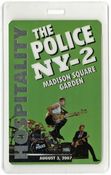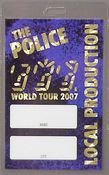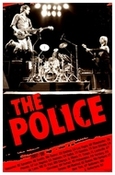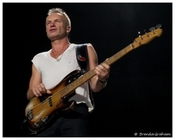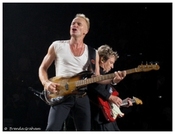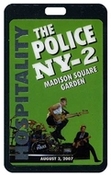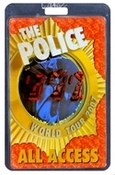
Police Reunion
Aug
3
2007
New York City, NY, US
Madison Square Gardenwith Fiction Plane
Arrested Development: The Police Return To Madison Square Garden...
Reunion tours are bittersweet affairs. On one hand, there's the thrill of reliving a part of your youth by seeing a band you thought would never play together again; on the other, there's the disquieting feeling that occurs when you reflect on how much you've aged between the two shows. Twenty-one years ago, in the summer before my senior year of high school, I saw The Police close the Amnesty International benefit from the prime vantage spot of two rows from the top of Giants Stadium. Other than being two decades older, not much has changed for Sting, Andy Summers and Stewart Copeland: they can still sell out arenas and stadiums at a breakneck pace. As for me, but for the intervention of a couple friendly corporate real estate lawyers, my seats for The Police's return to Madison Square Garden would have been in the same row as they were in high school. I guess the more things change, the more they really do stay the same.
I've always been struck by the depths of the infatuation The Police - well, mostly Sting - inspired from women. Even as far back as elementary school, I can remember one girl being so obsessive in her Sting worship that to disparage him in her presence brought a response as furious as that normally reserved for collection agents and angry girlfriends. Usually bands that receive that type of reaction from women lose all of their male fans but The Police were that rare breed that could attract rabid fans of both sexes. Regardless of whether the music struck your fancy, women lusted after Sting and men were willing to overlook the drooling in order to rock out to songs about blow-up dolls and the identifiable emotional angst of losing one girl and not being able to get next to another.
In addressing the sold-out crowd at Madison Square Garden, Sting noted that it had been nearly thirty years since The Police first came to New York City to play the now-defunct CBGB. Back then, the bohemian surroundings of Hilly Kristal's club provided the perfect venue for the London trio's heady mix of ska rhythms, punk beats and surly attitude. As he's now a staple on soft-rock radio, it's almost comical to recall an era when Sting was considered edgy. In The Police's waning days, they had ballooned into a bloated arena rock spectacle. It's a dichotomy they're cognizant of: premising 1995's double CD release The Police Live! on the differences between the band in their infancy and the bombast of their final days. In picking up where they left off, the Garden provided the perfect environs to house their matured sound.
It's manifestly unfair to expect The Police to sound like they did in their youth, even if they are making a game effort at it. The songs from their Synchronicity period, by which point they had grown into one of the more popular bands on the planet, come across much the same as they did in the Eighties. It's the songs, like 'Driven To Tears', 'Can't Stand Losing You' and 'Roxanne' that seem overshadowed by their own weighty significance. The Police delivered them with zeal but lacked the reckless abandon that accompanies the exuberance of youth. Ultimately, on much of the older material, they sounded a half a beat to slow.
Sting has taken liberties with much of their back catalog over the years, rendering 'Roxanne' as an acoustic ballad or 'Bring On The Night/When The World Is Running Down' as a jazzy finger-snapping medley. For the Garden show, there is no Sting-ification of the back catalog or senseless Kanye West cameos. Sting, Summers and Copeland simply did their estimable best to play every song in the style that Police fans would want. In trying to include every song that should rightfully be played on their reunion tour, a task they pretty much accomplished, the set list lacked any rarities or true surprises.
One of the more enjoyable elements of The Police's old albums is Sting's penchant for catchy chants and the occasional wailing howl. Sting didn't torture his voice to reach the same screams of yesteryear, but it had little effect on the show. Even if he tried, the fans would have drowned him out, preferring to cathartically yowl on their own. For some reason, Sting's sing-along choruses have received much attention and critical analysis as to their cultural relevance or representations of his significance as a songwriter. Whatever the historical value, there's no denying that it's flat out fun to belt out an off-key 'eeee o, eeee yay, eeee yay yo,' at the top of your lungs.
If the clash of personalities that ultimately led to the break up the band still exists, the three aren't bringing them onto the stage. Far from Sting and his two old friends, The Police played as a cohesive unit, bringing back songs that have long worked their way into the collective unconscious of classic rock. Sting's bass lines, so integral to the band's visceral impact, ran the gamut from transcendent ('Message In A Bottle' and 'Walking On The Moon') to disappointing ('De Do Do Do, De Da Da Da' and the saccharine yet still powerful 'Every Breath You Take'). Playing a beat-up bass that looked like it had seen better days, Sting moved lithely around the stage. Whenever Andy Summers would take center stage for a guitar solo, Sting would take the opportunity to roam to the wings and acknowledge the masses. Wearing a headband that made him look like he was ready to pick up a Donnay racket and challenge John McEnroe at Wimbledon, Copeland wailed away on his kit, moving to an impressive array of xylophones, bongos and a giant gong to give 'Wrapped Around Your Finger' and 'Walking In Your Footsteps' their off-kilter percussion.
Overblown reunion tours at Madison Square Garden tend to be a corporate boondoggle and The Police's stop was no exception with ticket brokers reselling seats for as much as $2000. Unlike many shows where the band's fans get first crack at the prime seats, members of the Best Buy Rewards Program, the tour's sponsor, received preferential treatment. Best Buy's entry into this already dubious market wouldn't be so egregious if the prime incentive to join The Police's fan club (for $100) wasn't the opportunity to get advance seats. It begs the question: What can a fan do if all they want is to get next to The Police? The answer seems simple: open up your wallet. Sting always said it was his destiny to be the King of Pain.
(c) Earvolution by David Schultz
Reunion tours are bittersweet affairs. On one hand, there's the thrill of reliving a part of your youth by seeing a band you thought would never play together again; on the other, there's the disquieting feeling that occurs when you reflect on how much you've aged between the two shows. Twenty-one years ago, in the summer before my senior year of high school, I saw The Police close the Amnesty International benefit from the prime vantage spot of two rows from the top of Giants Stadium. Other than being two decades older, not much has changed for Sting, Andy Summers and Stewart Copeland: they can still sell out arenas and stadiums at a breakneck pace. As for me, but for the intervention of a couple friendly corporate real estate lawyers, my seats for The Police's return to Madison Square Garden would have been in the same row as they were in high school. I guess the more things change, the more they really do stay the same.
I've always been struck by the depths of the infatuation The Police - well, mostly Sting - inspired from women. Even as far back as elementary school, I can remember one girl being so obsessive in her Sting worship that to disparage him in her presence brought a response as furious as that normally reserved for collection agents and angry girlfriends. Usually bands that receive that type of reaction from women lose all of their male fans but The Police were that rare breed that could attract rabid fans of both sexes. Regardless of whether the music struck your fancy, women lusted after Sting and men were willing to overlook the drooling in order to rock out to songs about blow-up dolls and the identifiable emotional angst of losing one girl and not being able to get next to another.
In addressing the sold-out crowd at Madison Square Garden, Sting noted that it had been nearly thirty years since The Police first came to New York City to play the now-defunct CBGB. Back then, the bohemian surroundings of Hilly Kristal's club provided the perfect venue for the London trio's heady mix of ska rhythms, punk beats and surly attitude. As he's now a staple on soft-rock radio, it's almost comical to recall an era when Sting was considered edgy. In The Police's waning days, they had ballooned into a bloated arena rock spectacle. It's a dichotomy they're cognizant of: premising 1995's double CD release The Police Live! on the differences between the band in their infancy and the bombast of their final days. In picking up where they left off, the Garden provided the perfect environs to house their matured sound.
It's manifestly unfair to expect The Police to sound like they did in their youth, even if they are making a game effort at it. The songs from their Synchronicity period, by which point they had grown into one of the more popular bands on the planet, come across much the same as they did in the Eighties. It's the songs, like 'Driven To Tears', 'Can't Stand Losing You' and 'Roxanne' that seem overshadowed by their own weighty significance. The Police delivered them with zeal but lacked the reckless abandon that accompanies the exuberance of youth. Ultimately, on much of the older material, they sounded a half a beat to slow.
Sting has taken liberties with much of their back catalog over the years, rendering 'Roxanne' as an acoustic ballad or 'Bring On The Night/When The World Is Running Down' as a jazzy finger-snapping medley. For the Garden show, there is no Sting-ification of the back catalog or senseless Kanye West cameos. Sting, Summers and Copeland simply did their estimable best to play every song in the style that Police fans would want. In trying to include every song that should rightfully be played on their reunion tour, a task they pretty much accomplished, the set list lacked any rarities or true surprises.
One of the more enjoyable elements of The Police's old albums is Sting's penchant for catchy chants and the occasional wailing howl. Sting didn't torture his voice to reach the same screams of yesteryear, but it had little effect on the show. Even if he tried, the fans would have drowned him out, preferring to cathartically yowl on their own. For some reason, Sting's sing-along choruses have received much attention and critical analysis as to their cultural relevance or representations of his significance as a songwriter. Whatever the historical value, there's no denying that it's flat out fun to belt out an off-key 'eeee o, eeee yay, eeee yay yo,' at the top of your lungs.
If the clash of personalities that ultimately led to the break up the band still exists, the three aren't bringing them onto the stage. Far from Sting and his two old friends, The Police played as a cohesive unit, bringing back songs that have long worked their way into the collective unconscious of classic rock. Sting's bass lines, so integral to the band's visceral impact, ran the gamut from transcendent ('Message In A Bottle' and 'Walking On The Moon') to disappointing ('De Do Do Do, De Da Da Da' and the saccharine yet still powerful 'Every Breath You Take'). Playing a beat-up bass that looked like it had seen better days, Sting moved lithely around the stage. Whenever Andy Summers would take center stage for a guitar solo, Sting would take the opportunity to roam to the wings and acknowledge the masses. Wearing a headband that made him look like he was ready to pick up a Donnay racket and challenge John McEnroe at Wimbledon, Copeland wailed away on his kit, moving to an impressive array of xylophones, bongos and a giant gong to give 'Wrapped Around Your Finger' and 'Walking In Your Footsteps' their off-kilter percussion.
Overblown reunion tours at Madison Square Garden tend to be a corporate boondoggle and The Police's stop was no exception with ticket brokers reselling seats for as much as $2000. Unlike many shows where the band's fans get first crack at the prime seats, members of the Best Buy Rewards Program, the tour's sponsor, received preferential treatment. Best Buy's entry into this already dubious market wouldn't be so egregious if the prime incentive to join The Police's fan club (for $100) wasn't the opportunity to get advance seats. It begs the question: What can a fan do if all they want is to get next to The Police? The answer seems simple: open up your wallet. Sting always said it was his destiny to be the King of Pain.
(c) Earvolution by David Schultz
August 3, 2007
SET LIST
- Message In A Bottle
- Synchronicity II
- Walking On The Moon
- Voices Inside My Head
- When The World Is Running Down You Make The Best Of What's Still Around
- Don't Stand So Close To Me
- Driven To Tears
- Truth Hits Everybody
- The Bed's Too Big Without You
- Every Little Thing She Does Is Magic
- Wrapped Around Your Finger
- De Do Do Do, De Da Da Da
- Invisible Sun
- Walking In Your Footsteps
- Can't Stand Losing You
- Roxanne
- King Of Pain
- So Lonely
- Every Breath You Take
- Next To You

